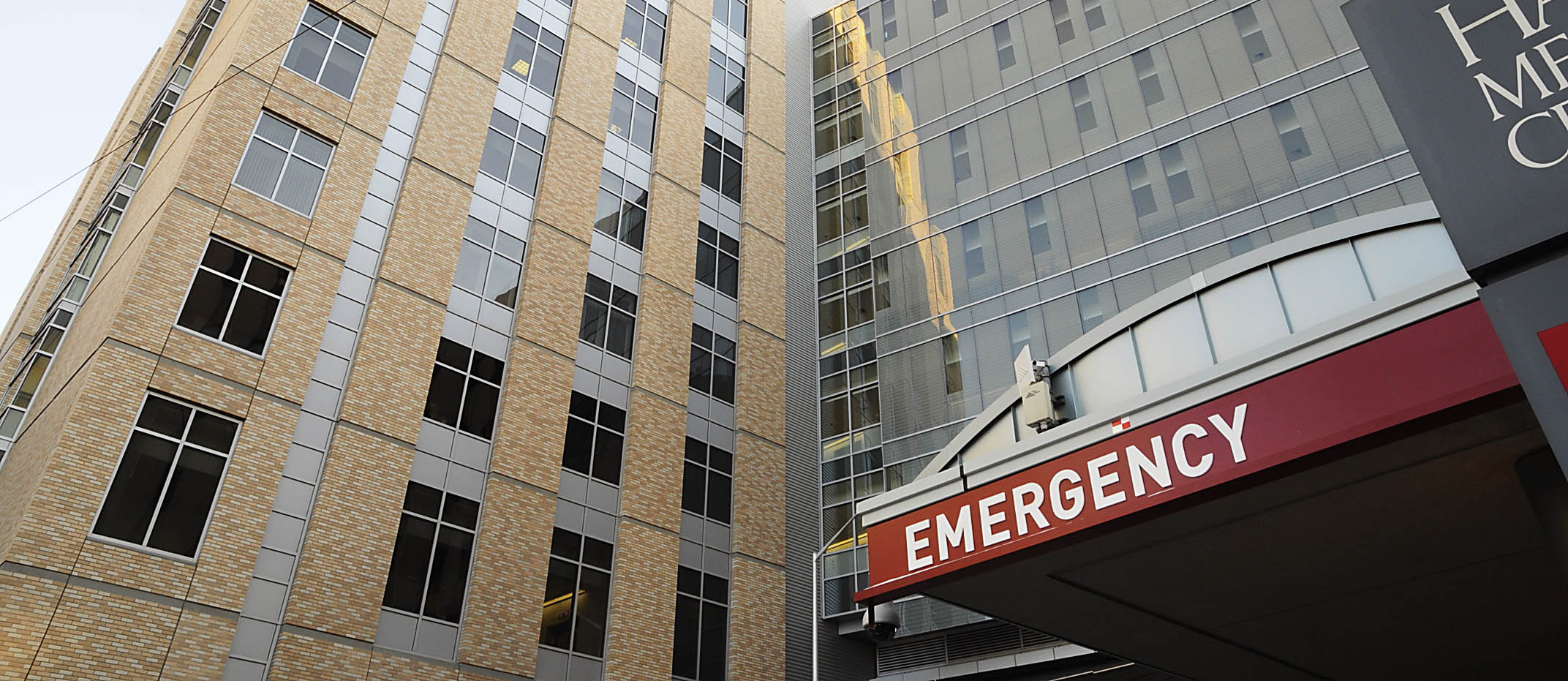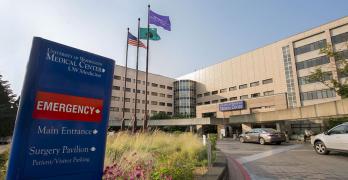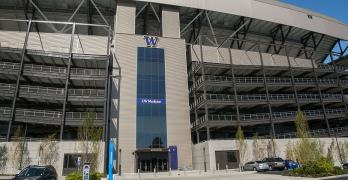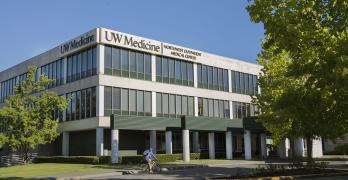Rehabilitation Medicine
Rehabilitation and physical therapy that helps you recover, rebuild and rediscover

Nationally-ranked expertise meets all-inclusive care.
Ranked Top in the Nation
U.S. News & World Report recognizes UW Medical Center's rehabilitation program — where we treat a full spectrum of injuries including major traumas — among the top in the nation.
Collaborative Care
Our multidisciplinary team approach means that we work closely with many types of specialists to give you the best possible path to recovery.
You're the Key Player
We partner with you throughout your journey to maximize your capabilities. Our patients' functional independence measures exceed national averages.

Meet the provider: Janna Friedly, M.D.
Dr. Friedly is a board-certified physical medicine and rehabilitation physician who strives to create active partnerships with her patients to achieve the best possible outcomes. In her free time, she enjoys playing with her four rescue dogs and two boys.
Some of our common services:
If you’ve had surgery to remove part of your arm or leg, you’ll benefit from a multidisciplinary approach to your care. A physiatrist is a physician with specialized training in amputee care and will coordinate your rehab program. Typically, a new amputee will meet early on with a prosthetist to learn about prosthetic options. Physical or occupational therapy are often involved to work on exercises, mobility or activities of daily living. Rehab psychologists work with patients routinely to address adjustment issues related to a new disability. Our skilled nursing team provides patient and family education.
If you have a severe burn over more than 10 percent of your body, you'll likely need specialized rehab. Harborview's verified Regional Burn Center and multidisciplinary burn rehab teams have a high success rate in helping patients recover and return to work after serious burns.
UW Medicine's hand therapy service focus on restoring function and reducing pain caused by many common conditions, including:
Fractures and dislocations
Tendonitis
Carpal tunnel syndrome
Repetitive stress injuries
Lacerations
Tendon and nerve damage
Arthritis and inflammatory disorders
Spasticity and weakness from stroke or other neurologic issues
Patients receive an assessment by a licensed occupational therapist or certified hand therapist to identify any upper extremity problems. Based on this assessment, a variety of treatments are available to help patients recover and prevent future injuries. They include:
Custom splinting and orthotics
Pain management
Wound and scar care
Edema (swelling) control
Adaptive techniques and equipment for work and daily activities
Desensitization and sensory re-education
Exercise to increase motion, dexterity and strength
Training in energy conservation, ergonomic principles, posture and body mechanics
Patient education and individualized home-based services
UW Medicine therapists work closely with the patient’s primary care physician to provide seamless care. A physician’s referral is required.
After severe neurological or traumatic injury, such as stroke or another major medical event, intensive inpatient rehabilitation can help people get on the road to recovery. Harborview and UW Medical Center each have a certified inpatient rehabilitation unit for intensive therapy designed to maximize independence and recovery. Patients must be able to tolerate three hours of therapy daily and require the services of multiple disciplines (occupational, physical, speech) to participate in this program.
Harborview Medical Center’s Inpatient Rehabilitation Unit is dedicated to providing the highest quality care to individuals who have sustained a traumatic injury or stroke and require intensive therapy to return to an active role at home or in the community. With your goals in mind, we work together to optimize your recovery.
Specialists at the Rehabilitation Unit at UW Medical Center provide expert care to patients with a wide variety of medical conditions, injuries and illnesses. Our goal is to maximize your potential and help you achieve as much independence as possible.
Joint replacement is surgery to remove and replace an arthritic or damaged joint with an artificial joint. With the help of a rehab program after surgery, many people who have a total joint replacement can still lead functional, active lifestyles. Our rehab programs include special exercises to restore function, mobility and strength to the new joint and surrounding muscles.
Multiple Sclerosis (MS) is a long-lasting, chronic disease of the central nervous system that is thought to be an autoimmune disorder. Some people with MS may only have mild symptoms, while others may lose their ability to see clearly, write, speak or walk. The Multiple Sclerosis Center at UW Medical Center - Northwest is an award-winning specialty center where a team of expert providers offer specialized rehab for maintaining optimal wellness while living with this condition.
UW Medicine provides both inpatient and outpatient occupational therapy evaluation and treatment services. We help people whose lives have been disrupted by illness, injury or neurologic changes from stroke or traumatic brain injury. Our goal is to help patients achieve the highest level of function and independence possible.
Our team of licensed, registered occupational therapists works with patients, their families and other members of the patient’s rehabilitation team to teach special techniques to facilitate independence in day-to-day activities. During the course of treatment, occupational therapists continually reassess the patient’s progress and coordinate with team members to achieve therapy goals.
We provide:
Inpatient therapy for patients in medical and surgical units
Inpatient and outpatient services
A pre-operative joint replacement class
Parkinson’s rehabilitation services
Oncology rehabilitation and lymphedema services
Vestibular disorder services
Hand therapy
Therapy includes:
Increasing independence in daily activities and recommendation of appropriate equipment as needed
Cognitive retraining in basic and higher living skills, such as money management and meal planning and preparation
Instruction in conserving physical energy, simplifying work and body mechanics for those with limited endurance
Training to compensate for low vision or visual perception problems
Strategies and exercises to improve balance and minimize dizziness due to vestibular disorders
Improving upper body strength, coordination, mobility and activity tolerance
Restoring hand function after injury, surgery, illness, repetitive motion problems or age-related changes
Inpatient occupational therapy requires a physician's referral. We recommend checking with your insurance provider to see if outpatient treatment is covered."
This disease causes weak, thinning bones, leaving them at greater risk of breaking. The bones most often affected are the hips, spine and wrists. An osteoporosis rehab program can be vital to a full recovery. Our rehab programs help decrease pain, prevent fractures and minimize further bone loss.
UW Medicine provides a comprehensive approach to managing the symptoms of Parkinson's disease. We individually tailor rehabilitation to the abilities and needs of each patient. Our goals are to maximize physical skills, enhance vocal and cognitive skills, improve safety and enable people with Parkinson’s to live as independently as possible.
A dedicated, interdisciplinary team of medical professionals is involved in the evaluation and treatment of each Parkinson’s patient. A licensed physical therapist, occupational therapist and speech language pathologist assess each patient, then customize a treatment plan that addresses all aspects of the patient’s condition and provides a complete picture of that patient’s unique needs and abilities.
This initial evaluation may last up to three hours depending upon which therapies a patient might need.
Physical therapy works to improve balance, gait, posture, mobility, strength and flexibility. Assessments include evaluation of symptom severity and balance and mobility function tests.
Speech and language services focus on voice, speech, swallowing and cognitive/communication skills. Assessments utilize computerized analysis of vocal quality, loudness, pitch and speech intelligibility. We evaluate swallowing through clinical assessment and/or using videofluoroscopic testing. We also assess learning skills, memory function, concentration and problem solving.
Occupational therapy improves the ability to perform daily living activities, as well as higher living skills such as household tasks, meal preparation and handwriting. Evaluations determine the basic ability to function in these activities, particularly as they are affected by upper body rigidity, tremors and exceptionally slow movements.
Treatments address specific needs of patient and their caregivers, and may include:
Balance exercises
Introduction to adaptive devices to simplify self-care
Posture awareness and improvement
Lee Silverman Voice Treatment Program® by certified staff to improve speech volume
Safety awareness
Gait (walking) training
Speech and voice exercises for articulation, pitch and rate control
Strength and flexibility exercises
Techniques for daily activities, such as dressing, grooming, bathing and eating
Management of swallowing problems
Methods to simplify kitchen activities
Handwriting techniques
Strategies to enhance cognitive and communication skills
Functional mobility training, such as rising from a chair and getting in and out of bed
Education is also an important part of the program. Therapists will provide and recommend a wide variety of information and resources that can help patients manage common problem areas. A physician's referral is required.
Physical therapists in our programs have specialized training in pelvic floor evaluation and treatment. Pelvic pain and urinary incontinence can often be treated with a physical therapy program. Pelvic pain may be associated with tissue scarring after surgery or other changes to the pelvic muscles and fascia. Women and men who have difficulty controlling their bladder may benefit by participating in a specialized physical therapy program.
Physiatry, also known as physical medicine or rehabilitation, is a medical specialty focused on restoring function if it's been compromised as the result of disease, disorder or injury. Physiatrists address the function of the whole patient while treating a wide variety of medical conditions affecting the brain, spinal cord, nerves, bones, ligaments, muscles and tendons.
Physical therapists provide hands-on treatment focused on restoring mobility and function if it's been compromised as the result of injury, disease, overuse, pain or loss of a body part. Our skilled physical therapists develop individualized care plans based on the latest technologies and long-established therapies.
Skilled nursing facilities and rehabilitation centers support continued recovery through nursing care and therapy provided by registered nurses, certified nursing assistants, physical therapists, occupational therapists and speech therapists. Where the focus in a hospital is to treat and stabilize acute care needs, skilled nursing and rehabilitation aid in your recovery phase by providing wound care, intravenous (IV) therapy, physical therapy and continual monitoring of symptoms and vital signs.
A prosthesis is a device that replaces a missing body part that may have been lost through trauma, disease or a congenital condition. Our Prosthetics and Orthotics Clinic specializes in prostheses to replace any level of arm, leg, hand or foot.
An orthosis is a device that supports and aligns a weakened or misaligned part of the body to improve function, restrict motion or relieve pain. Our clinic provides many types of orthoses including those that support the spine, knee, ankle or foot.
Our skilled clinicians and technicians help patients reduce pain, increase comfort, provide stability, prevent deformity, address aesthetic factors and enhance function and independence.
A simple fall can be a frightening and sometimes life-changing event. It can decrease your mobility and independence and lead to hospitalization. Falls are a leading cause of fatal and non-fatal injuries. Each year, more than one-third of people aged 65 years or older experiences a fall.
UW Medicine's safety and gait enhancement services are designed to reduce the risk of injury from falls by improving a patient’s balance and mobility skills. Services involve an initial assessment by our licensed physical therapists. Patients are scheduled for weekly therapy sessions for four to eight weeks, plus a customized exercise plan to do at home every day. We evaluate leg strength and range of motion, balance and gait (how you walk). We also evaluate previous falls or balance issues and will develop a customized treatment and home exercise plan for each patient.
Safety and gait enhancement emphasizes strengthening, flexibility and balance exercises; shoe selection; safe walking training and techniques to safely rise from chairs.
Designed for individuals who are active but who have developed unsteadiness that has led to a fear of falling, our services help those who:
Walk slower than usual
Shuffle as they walk
Walk with their feet wide apart in an effort to maintain better balance
Reach for walls and furniture for balance
Are unsteady when turning
Have recently experienced a fall
Have difficulty sitting and rising from a chair
Treatment typically involves one to two visits a week for four to eight weeks. Services are covered by most insurance companies. A physician's referral is required.
UW Medicine's speech language pathologists offer a variety of therapeutic treatments to meet the needs of patients and their families, including comprehensive evaluation and individualized treatment for a variety of communication disorders, allowing patients to optimize their communication skills and return to a fulfilling life.
We specialize in the following:
Communication
Many people take for granted everyday tasks like stating your name, understanding the news, writing a letter or remembering an appointment. When injury or illness disrupts these abilities, frustration and isolation can follow. Impairments may result from stroke, head and neck cancer, brain injury, dementia or other neurological conditions such as multiple sclerosis, Parkinson’s disease, amyotrophic lateral sclerosis or Alzheimer’s disease.
Conditions may include:
Aphasia: problems speaking, understanding, reading, writing, telling time and/or using numbers
Cognitive-communication disorders: problems of memory, reasoning, problem solving, attention to tasks and awareness of surroundings
Dysarthria: weakness or incoordination of the speech muscles that makes speech difficult to understand
Apraxia: difficulty planning muscle movements for speech production, resulting in slow, labored speech
Dysphonia: voice disorders characterized by hoarseness or weakness
Swallowing
Difficulty swallowing, or dysphagia, is a common problem and can be caused by numerous medical conditions. Swallowing problems can lead to dehydration, malnutrition, pneumonia and the need for tube feeding or other nutritional alternatives. Clinical and videofluoroscopic swallow evaluations can determine what you can safely swallow using compensatory strategies and modifying food textures as needed.
Our individualized treatment services include:
A comprehensive evaluation of the speech, voice, language, swallowing and/or cognitive communication issues. This evaluation will help determine specific problems, how severe they are and what needs to be done to address them.
Individual and/or group therapy treatment programs
Education and training for patients, their families and caregivers
Counseling about additional treatment options and resources
Specialty services include:
Voice disorders: Using a computerized voice-analysis system, therapists analyze pitch, loudness and voice quality to develop techniques to improve voice quality.
Lee Silverman Voice Treatment®: Specialized treatment by certified staff for individuals with Parkinson’s disease or other neurological disorders to help increase volume (loudness) of the patient’s voice
Videofluoroscopic swallow evaluation: A dynamic X-ray used to test swallowing and ensure safe and optimal eating
Outpatient speech/language classes and support groups: Let the Games Begin
This conversational support group gives persons with acquired brain injury the opportunity to participate in group card and board games. As a member of the group, you play and interact with other individuals who have similar interests in a supportive, encouraging environment. This group is facilitated by a licensed Speech Language Pathologist who provides suggestions and encouragement, helping participants build confidence while having fun. Please call 206.668.1848 for more information.
Journaling for recovery from mild brain injury
Story can be medicine. Through the process of journaling, we discover the hope and gifts from within ourselves to support optimal wellness and continued recovery from acquired brain injury. The focus is to embrace a new life by sharing your story with others who are also on the path of recovery. Class members learn about the healing power of journaling and receive a workbook, “After Brain Injury: Telling Your Story,” by Barbara Stahura, to help guide this process. Class meets weekly for six consecutive two-hour sessions in the spring and fall. It is facilitated by a licensed speech language pathologist who is board certified in neurogenic communication disorders. Please call 206.668.1848 for more information.
Talk loud and proud
Using techniques from the Lee Silverman Voice Program, this group gives persons with Parkinson’s disease an opportunity to practice speaking with a stronger voice in a group setting. Strategies and exercises are designed to increase speaking volume, improve voice quality and reduce speaking rate so speech becomes more easily understood. Some of the group activities may include games, skits, reading out loud or telling stories. It is a supportive environment intended build confidence in conversational skills. Please call 206.668.1848 for more information."
Your spinal cord carries messages between your brain and your body that allow you to carry out daily activities. If you've had a spinal cord injury, rehab can help you regain as much functionality as possible. Our Inpatient Rehabilitation Unit at Harborview specializes in traumatic spinal cord injuries. Patients continuing their recovery as outpatients receive quality care in our outpatient spinal cord injury program.
If your spinal cord becomes injured near or below the top of your lower back, you could develop paraplegia—the loss of all or part of your movement, sensation and organ function in the lower half of the body. We offer nationally recognized rehab services in physical therapy, nursing, vocational counseling, clinical psychology, therapeutic recreation and more.
This is the loss of movement and sensation in one arm and both legs, usually resulting from partial damage to the upper portion of the spinal cord. Our highly effective rehab programs include physical therapy, skilled nursing, vocational counseling, clinical psychology, therapeutic recreation and more.
Stroke rehab programs, either inpatient or outpatient, help you regain as much independence and quality of life as possible after a stroke. Our multidisciplinary stroke rehab teams include many types of skilled specialists who help you recover physically, emotionally and socially, relearn functional skills and develop new ways to perform daily activities.
If you've experienced a traumatic brain injury, you might need rehab in order to help regain functionality and prevent complications. Our inpatient rehabilitation programs are leaders in care for traumatic brain injuries. We exceed national and regional averages in post-discharge functional independence measures. Patients continuing their recovery as outpatients receive quality care in our outpatient brain injury programs.
Selecting a wheelchair is a very individual and personal decision, especially when you depend on the wheelchair for mobility. UW Medicine offers wheelchair seating and evaluation services specifically designed to assist with this. Our team includes a licensed physical therapist and a wheelchair vendor who guide patients through this often confusing and time-consuming process.
The physical therapist reviews the patient’s current functional level, medical condition and the environment in which the wheelchair will be used. If needed, the wheelchair vendor is available to help select the best combination of wheelchair and positioning devices to meet the patient’s needs.
We will ask you questions about how you will use your chair, including:
Will the chair be used on rough terrain (gravel, sand, hills)?
Is it important that you have regular access to certain places, such as a workplace?
In what areas of the home will the chair be used?
How will you move your wheelchair in and out of a vehicle?
Where will you store your chair at home and in your vehicle?
We also take into consideration the wheelchair’s cost and your insurance benefits; its size in relation to your home and work environment; types of controls needed; features such as reclining back or leg rests, upholstery, cushions and seating additions; wheel arrangements and ongoing maintenance requirements.
Once we have evaluated your needs, taken measurements and helped you select equipment options, the vendor will place the order to build the wheelchair. This may take two to four weeks. A final fitting session may be needed to adjust the chair to achieve maximum comfort and function.
Our physical therapists also supervise a “test spin” designed to ensure you can negotiate real-life obstacles, whether you are an experienced wheelchair user or not.
Wheelchair seating and evaluation is scheduled on an individual basis and takes about 60 to 90 minutes. We can also help those currently using a wheelchair with upgrading a wheelchair or considering other wheelchair technologies. A physician's referral is required.
Convenient care, in your neighborhood.
Comprehensive Outpatient Rehabilitation Program at Harborview
Medical Specialties
Hours Today
Appointments
Rehabilitation Medicine Clinic at UW Medical Center - Montlake
Medical Specialty
Hours Today
Appointments
Sports Medicine Center at Harborview
Medical Specialties
Hours Today
Appointments
Sports Medicine Center at Husky Stadium
Medical Specialties
Hours Today
Sports Medicine Clinic at Northwest Outpatient Medical Center
Medical Specialties
Hours Today
Appointments

Should I go to the emergency room or urgent care?
If you have an illness or injury that you think may be life-threatening without immediate care, call 911 or go to the nearest emergency room.
If you have an illness or injury that is not life-threatening but needs attention today, go to urgent care.





